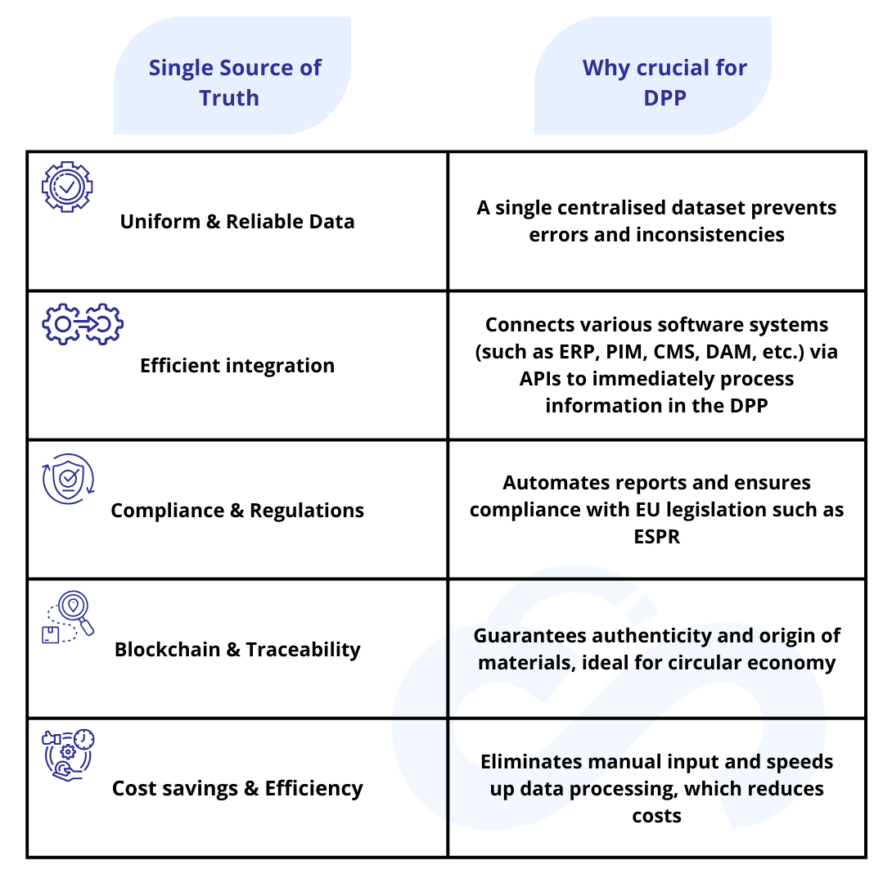What is a Digital Product Passport and why is Intelligent Informationmanagement an essential part of it?

In a world where sustainability, circularity and transparency are increasingly important, technology plays a crucial role in making products and processes sustainable. One of the developments contributing to this is the Digital Product Passport (DPP). But by integrating your digital product passport with an Intelligent Information Management (IIM) platform, companies can respond to these new regulations even more efficiently and effectively. In this blog, we dive into the concept of the Digital Product Passport (DPP) and explain why IIM (Intelligent Informationmanagement) is crucial for a successful implementation.
What is a Digital Product Passport?
The Digital Product Passport (DPP) is an innovative tool that takes sustainability and circularity to the next level within the EU. The European Commission officially introduced the concept as part of the Circular Economy Action Plan and the Ecodesign for Sustainable Products Regulation (ESPR). From 18 July 2024, the ESPR will enter into force and apply to all companies selling products in the EU covered by the delegated acts, regardless of whether the products were produced inside or outside the EU.
The aim of these regulations is to make Europe the first climate-neutral continent by 2050."
The requirement for companies to comply with Digital Product Passport (DPP) requirements will be phased in, depending on the product category. This digital document contains all essential information about a product throughout its life cycle such as:
- Origin of materials
- Production methods
- Sustainability features
- Instructions for reuse, repair and recycling
- Carbon footprint and energy consumption
Companies that fail to comply with this legislation may face various sanctions: financial fines, market restrictions, legal action, reputational damage, etc. The exact sanctions are determined per member state within the framework of the EU regulation.
The introduction of the DPP is an important step towards a circular economy, where products are reused and recycled more efficiently. It promotes transparency in the production chain and enables consumers to make informed choices based on the sustainability of products.
Via a QR code or NFC tag on the product, consumers, producers and regulators can easily gain insight into the entire product chain.
Implications for different braches
Implementing a Digital Product Passport (DPP) poses many challenges for companies. This is due to the complexity of supply chains, technical requirements and legal frameworks.
One of the biggest obstacles in developing a Digital Product Passport (DPP) is that companies are often unsure where all the necessary information should come from. There are several reasons for this:
- Lack of standardisation: There are different data models and standards in circulation (GS1, EPCIS, JSON-LD), so companies do not always know which structure to follow. This can lead to compatibility issues between systems and delays in adoption.
- Complex supply chains: Product information is spread across different links in the chain, from raw material suppliers to final manufacturers, making it difficult to obtain a complete dataset. It is not easy to obtain traceable and reliable data from all parties. An incomplete DPP undermines transparency and regulatory compliance.
- Data quality and availability: Not all companies record or hold the right data. Some suppliers still work with paper records or outdated IT systems.
- Confidentiality and competitive sensitivity: Some information (e.g. on materials or production processes) is considered trade secrets. Suppliers do not always want to be transparent about their data.
- Regulatory complexity:The European Union is working on legislation for DPPs (as in the Ecodesign for Sustainable Products Regulation - ESPR), but many companies do not know exactly what data they need to submit and how to be compliant.
- Operational Execution: The DPP requires a continuous flow of up-to-date data, which means an operational infrastructure is needed to keep it up to date. Companies need to review their internal processes and possibly integrate new technologies.
IIM and DPP: foundation for reliable and traceable data
An Intelligent Information Management Platform (IIM) and a Digital Product Passport (DPP) are a powerful engine for transparency, efficiency and sustainability. A Single Source of Truth plays an essential role in the successful implementation of a Digital Product Passport (DPP). Many companies often struggle with fragmented data, leading to inconsistencies and inefficiencies. An IIM centralises, standardises and makes all product information easily accessible to all stakeholders,
Integrating these systems creates a dynamic ecosystem where product data is available in real-time, regulations are effortlessly complied with and supply chains operate smarter and more sustainably. This accelerates the transition to a circular economy, improves decision-making and stimulates collaboration, ensuring that companies not only operate more efficiently but also remain future-proof in an increasingly stringent market. A single source of truth and DPP go hand in hand: with SSOT providing the essential basis for accurate information processing.

Want to discover how your organisation can become DPP-ready? Zeticon and Tracked help companies with the right tools to smartly manage your information and comply with the latest regulations. Contact our experts in this field and take the first step towards a more sustainable future!
Is your organisation next in line?
Together we find the right solution to your questions